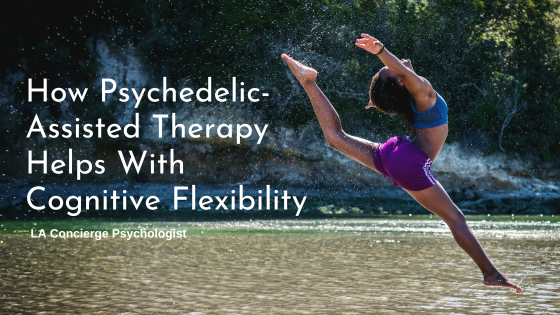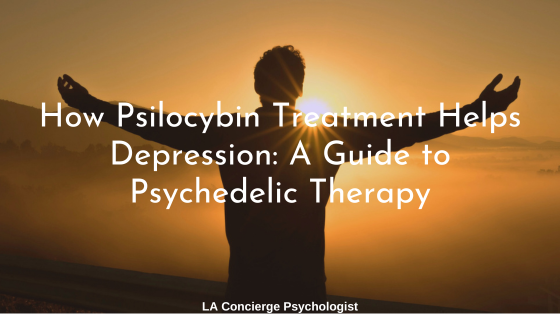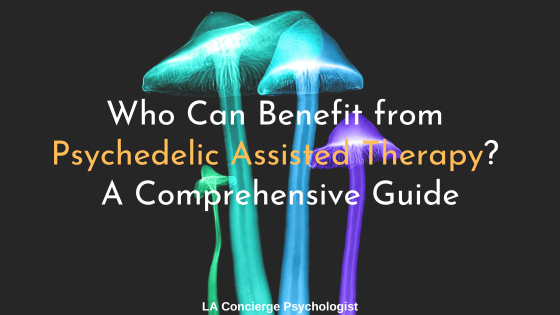Scientific research has shed new light on psilocybin, the psychoactive compound found in “magic mushrooms”, as a potential breakthrough treatment for anxiety. The potential for psychedelic assisted treatment to address anxiety, mood disorders, trauma-related conditions, and substance use disorders continues to generate significant scientific excitement.
Psilocybin is a naturally occurring psychedelic compound found in certain species of mushrooms, traditionally used in spiritual and cultural practices for centuries. Unlike conventional anxiety medications that often require daily intake and can produce challenging side effects for some, psilocybin shows potential as a transformative treatment[1] that may require only a few carefully supervised sessions.
Psilocybin is emerging as a promising therapeutic tool for people struggling with persistent and treatment-resistant anxiety[2]. This article is going to look at how psychedelic treatment can help people with anxiety and what you can expect from the treatment process.
The Neuroscience Behind Psilocybin’s Anxiety-Reducing Effects
At the core of psilocybin’s therapeutic effects is its unique interaction with the brain’s serotonin receptors. When ingested, psilocybin is converted to psilocin, primarily acting on the 5-HT2A serotonin receptors[3]. This interaction triggers a mental state that can profoundly impact someone’s emotional processing, allowing them to be more receptive to treatment.
Research suggests that psilocybin can temporarily disrupt default neural networks—the brain’s typical patterns of communication and information processing. This disruption appears to create what neuroscientists call a “reset” effect, allowing the brain to form new neural connections and break free from entrenched thought patterns associated with anxiety.
Neuroplasticity, Psilocybin, and Anxiety
One of the most exciting discoveries is psilocybin’s potential to enhance neuroplasticity— the brain’s ability to form new neural connections. Cody Wenthur, an assistant professor in the University of Wisconsin–Madison School of Pharmacy’s Pharmacy Practice and Translational Research Division says:
“one of the fascinating things about psychedelics as it relates to behavior is that the compounds themselves are only in your body for a matter of hours, but often the effects that are reported — the behavioral changes and changes in symptoms around psychiatric conditions — persist for weeks to months and, in extreme cases, years.[4]”
For people with anxiety, this means the potential to rewire deeply ingrained negative thought patterns and emotional responses. Traditional talk therapy and medications often struggle to create such fundamental shifts in neural architecture and can take much longer overall.
Psilocybin’s Impact on Anxiety
The following research explores how psilocybin may offer meaningful support for specific forms of anxiety.
Terminal illness and end-of-life anxiety
Some of the most compelling research has focused on anxiety experienced by patients with terminal cancer diagnoses[5]. Multiple studies have demonstrated that psilocybin assisted therapy can dramatically reduce anxiety and depression in individuals confronting end-of-life challenges.
In these controlled clinical settings, patients typically receive psilocybin in a carefully monitored environment, accompanied by trained therapists. The experiences often lead to profound psychological insights, reduced fear of death, and a significant improvement in overall quality of life.
Generalized anxiety disorder and social anxiety
Emerging research also explores psilocybin as a treatment for generalized anxiety disorder. Preliminary studies suggest that carefully administered psilocybin sessions can provide relief that extends far beyond the immediate psychedelic experience, with some participants reporting sustained anxiety reduction for months after treatment. Studies have shown encouraging efficacy in reducing anxiety symptoms, increasing self-perception, and increasing social function in patients with generalized anxiety disorder and social anxiety disorder[6].
What Does Psychedelic Treatment for Anxiety Look Like?
Psilocybin therapy is not simply about consuming a psychedelic substance. It involves a multi-step therapeutic approach. Here’s what to expect.
1. Professional psychological preparation and support
Before the actual psychedelic session, patients engage in preparatory therapy. These initial session focuses on building trust with your therapist and setting intentions for the psychedelic experience. Patients learn about what to expect during the treatment and address any fears or concerns. This preparation is essential for creating a supportive and safe framework for the upcoming experience.
2. Guided psychedelic sessions for anxiety in a safe environment
The core of the treatment is a carefully controlled psychedelic session conducted in a comfortable, safe, and controlled environment. Patients ingest a carefully measured dose of psilocybin and are supported by therapists throughout the experience. Carefully selected music to support their inner journey, allowing them to explore deep psychological landscapes with professional guidance. Some clients opt to use an eye mask to further deepen their inner journey.
3. Integration therapy to help process and incorporate new insights
Perhaps the most critical component is the follow-up integration sessions. Multiple therapy sessions in the days and weeks after the psychedelic experience help patients process and make sense of the insights gained. Therapists work with patients to discuss and apply new perspectives to daily life, working through any challenging emotions or revelations. The goal is to support long-term psychological growth and healing.
The therapeutic process doesn’t have to end with the integration sessions. In fact, ongoing check-ins to monitor long-term psychological changes and providing additional support as needed is advised. Potential follow-up sessions with your psychedelic assisted therapist may be scheduled to reinforce therapeutic gains and ensure continued progress.
Unlike traditional pharmaceutical treatments that often aim to suppress symptoms, psilocybin assisted therapy seeks to address root psychological mechanisms. The approach promotes deep personal insights, facilitates fundamental shifts in perspective, and supports holistic emotional healing.
Safety and Potential Risks of Psilocybin
While promising, it’s important to recognize that these treatments should only be conducted under professional supervision. Your therapist will be trained to manage and identify certain issues that could arise.
This could be supporting you through any temporary distress during the psychedelic experience or managing challenging psychological experiences. They will also be knowledgeable and able to discuss any potential worsening of underlying mental health conditions and interactions with certain medications that you should know about before going ahead.
For example, people with a personal or family history of psychotic disorders are typically excluded from psilocybin studies due to potential adverse reactions.
The Future of Psilocybin Treatment for Anxiety
Psilocybin treatment for anxiety represents a novel approach that goes beyond symptom management, offering a possibility of fundamental psychological transformation.
Currently, psilocybin remains a controlled substance in many jurisdictions. However, the landscape is rapidly changing. Several cities and states are exploring the regulated therapeutic use of psilocybin. Research institutions and medical centers continue to conduct clinical trials that may pave the way for broader acceptance.
We Offer Support for People with Anxiety Who’d Like to Try Psychedelic Therapy
By providing potentially long-lasting relief from anxiety, psychedelic therapy represents a paradigm shift in mental health treatment, offering a more transformative path to addressing psychological challenges. This holistic approach aims to address the root psychological mechanisms of anxiety for long-term relief, not just mask symptoms.
If you’re planning on using psychedelics, get the most therapeutic benefits out of your experience and reduce risk by employing the support of a psychedelic assisted therapist. If you’re interested in exploring these topics further with a psychologist who understands, Dr. Lee is here to help. Feel free to email her for more information or to schedule an appointment.
[1] The Therapeutic Potential of Psychedelic Drugs: Past, Present, and Future. Carhart-Harris, R. L., & Goodwin, G. M. (2019).
[2] A potential effect of psilocybin on anxiety in neurotic personality structures in adolescents. Croat Med J. (2021)
[3] Psilocybin induces acute anxiety and changes in amygdalar phosphopeptides independently from the 5-HT2A receptors. Harari et al. (2024).
[4] Understanding the Anxiety-Reducing Effects of Psilocybin: Nicole Sweeney Etter. (2023).
[5] Psilocybin produces substantial and sustained decreases in depression and anxiety in patients with life-threatening cancer: Griffiths, R. R., et al. (2016).
[6] Efficacy and Safety of Psychedelics in Treating Anxiety Disorders: Ochsner J. (2023).



